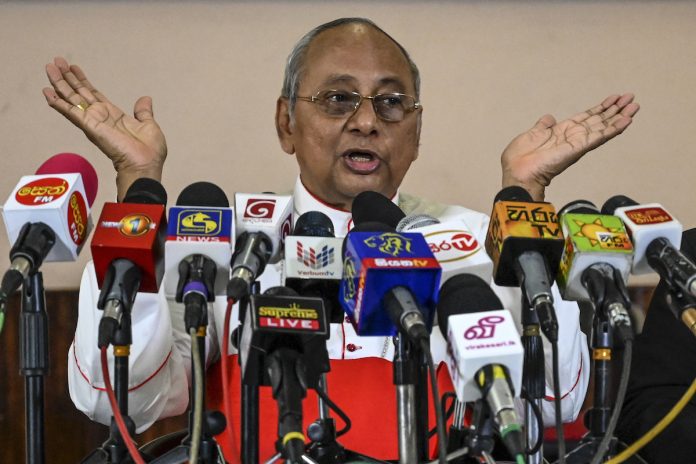Cardinal Malcolm Ranjith of Sri Lanka called on the country’s political leaders to make good on their promise to give up power this week even as he expressed hope that a new government will bring the country out of the political and economic crisis.
“[T]he leadership in this country has a bad record of promises being kept, so we are all waiting anxiously to see whether he, the president, will keep his promise to resign,” said the cardinal in a report on the news site Crux.
“We are skeptics of our political leaders and their promises,” Cardinal Ranjith was quoted as saying.
Protesters in Sri Lanka defied tear gas, water cannon and a state of emergency to storm the prime minister’s office on Wednesday after the country’s embattled president fled overseas.
The crowd demanded both President President Gotabaya Rajapaksa and Prime Minister Ranil Wickremesinghe to resign.
Speaking to Crux, Cardinal Ranjith said he thought “it was a good thing that the crowds descended on the city.”
“They made their leadership understand that they don’t have any confidence in them, and therefore the leadership was forced to make a decision” and announce their intention to step down, he said.
Rajapaksa, 73, promised at the weekend to resign on Wednesday after escaping his own official residence in Colombo just before tens of thousands of protesters overran it.
He flew to the neighboring Maldives early Wednesday: as president, he enjoys immunity from arrest, and he is believed to have wanted to go abroad before stepping down to avoid the possibility of being detained.
But midnight passed with no announcement he had stepped down.
In his absence he named as acting president Prime Minister Ranil Wickremesinghe, whose own office was soon afterwards mobbed by thousands of demonstrators demanding both officeholders should go.
“Go home Ranil, Go home Gota,” they shouted.
Tear gas and water cannon fired by police and the declaration of both a nationwide state of emergency and a curfew failed to disperse them and the crowd poured into the building.
One protester was killed due to suffocation from tear gas, police said.
Wickremesinghe, also 73, would automatically become acting president if Rajapaksa steps down, but has himself announced his willingness to resign if consensus is reached on forming a unity government.
“We can’t tear up our constitution,” he said in his statement. “We can’t allow fascists to take over. We must end this fascist threat to democracy,” he said, adding that the state had to re-establish control over the official buildings occupied by protesters.
The protesters’ actions were a repeat of the capture of the president’s home and office on Saturday, when Wickremesinghe’s private home was also set ablaze.
The presidential succession process could take between three days — the minimum time needed for parliament to elect an MP to serve out Rajapaksa’s term, which ends in November 2024 — and a maximum of 30 days allowed under the statute. – with a report from AFP









